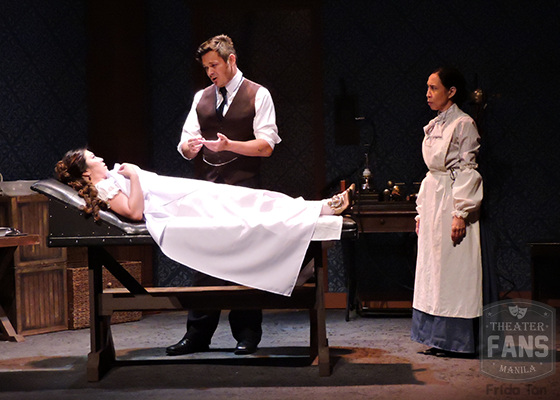
REVIEW: “In The Next Room, or The Vibrator Play” brings sexual healing
In the 19th century, women had it hard. Equality is so far into the future, the word was likely not yet invented. Women were suppressed, constricted, and made dependent of others—and not just by their corsets. It is a time when men simply took what’s theirs and female emotions are either tolerated or thought of as illnesses that ought to be cured.
In Sarah Ruhl’s “In the Next Room, or the Vibrator Play”, women have hysteria. They’re not hysterical per se, but are diagnosed with an encompasing malady as a result of built up fluids in the stomach. Dr. Givings (Joshua Spafford) has the cure: a vibrating contraption that is applied in the nether regions to induce “paroxysms”—essentially orgasms—release said fluid.

L-R: Caisa Borromeo (Sabrina Daldry), Joshua Spafford (Dr. Givings), Tami Monsod (Annie)
This all happens in his home clinic, right next to their living room where his wife, Catherine (Giannina Ocampo Van Hoven) perennially stays, entertaining herself as well as a revolving door of eccentric clients like Mrs. Daldry (Caisa Borromeo) brought in by her husband Mr. Daldry (Hans Eckstein), and later on, painter Leo Irving (Jef Flores).
The show takes awhile to thaw, with Ms. Ocampo Van Hoven and Ms. Borromeo still trying to find their comedic footing at the beginning. After the night’s first “paroxysm”, however, they find their groove and Ruhl’s hilarious writing whizzes sharply by, sending the audience in guffaws of laughter over delivery as well as physical comedy.
The show is not all awkward titters over staged orgasms. This is a story about women and how they are controlled by men.
Catherine laments over her loneliness, and general feeling of ineptitude as a mother who can’t produce enough milk to feed her child. She hires Elizabeth (Cara Barredo) to be her wet nurse, a poor woman who recently lost a child. Mrs. Daldry is treated like a problem her wandering husband needs to solve, and even Annie (Tami Monsod), Dr. Givings’s assistant, is cast away for being over thirty and unmarried. In those days, a successful woman is defined by marriage and motherhood.

L-R: Giannina Ocampo (Catherine Givings) and Caisa Borromeo (Sabrina Daldry)
While there is an overarching theme of women suppression, when it came to sexual understanding, the men were just as clueless. Mr. Givings was giving (pardon the pun) patients “paroxysms” without an ounce of sexual implication. Sex, in those days, was regarded as a perfunctory necessity for procreation. To take pleasure—or even to find intimacy—in sex is not the done thing for gentlemen and gentlewomen. In the second act, where the women talk about their “paroxysms”, Elizabeth inquires if it is the same sensations Mrs. Givings and Mrs. Daldry feel when they have relations with their spouses. The two are comically dumbstruck and embarrassed to even consider that kind of unrestrained expression in the presence of their own husbands.
It’s a different kind of Dark Ages, where both men and women were in the dark about their own bodies and society restricts what is natural in the name of propriety. Even in private and around family, they are prim and proper, referring to each other as “Mr. Givings” or “Mrs. Givings”. There is very little relief—sexual, or otherwise—even in the comfort of their own homes.

Hans Eckstein (Mr. Daldry) and Giannina Ocampo (Catherine Givings)
Ruhl’s story of women living in a world built for men becomes an exploration and understanding of intimacy for both sexes. It culminates with an ending where the set is stripped away and only Mr. and Mrs. Givings are left on stage to find release—literally and figuratively—from the shackles of their society’s stringent norms.
It’s the 443rd production for Repertory Philippines, currently celebrating 50 years and 81 seasons. Chris Millado directs the show with the same steady hand that made his previous ensemble comedy, “August: Osage County” a hit.
The company also brought in former Repertory player, Joshua Spafford to play a thoroughly likable Dr. Givings. Giannina Van Hoven as Mrs. Givings is well-cast. Prone to inchoate ramblings that occasionally stumbles upon profound truths, her Catherine is charming and earnest, if a bit dippy.
Sabrina Daldry required a lot of Caisa Borromeo, and she was superb for all of it—whether it’s the physical comedy of simulating (multiple!) paroxysms, to playing the piano on stage. Cara Barredo’s character, in a lot of ways, bears the most baggage and she performs her role with restraint and dignity. Jef Flores, too, was in his element playing manic pixie dream boy-type character, Leo Irving.
The production’s technical aspects were also a strong suit. Mio Infante’s set is detailed, intricate, and well-researched, from the wall paper designs down to the 19th century vibrator. The show’s costumes (Bonsai Cielo) were stars in their own right. The play frequently showed the involved process of getting dressed and undressed, and they were quite mesmerizing to watch.
The most stimulation you’ll get out of this show is an intellectual one. While not raunchy or even titillating, it is provocative in its own way, raising questions about society, gender roles, and human intimacy in the dawn of new technology.
You can buy tickets HERE.

